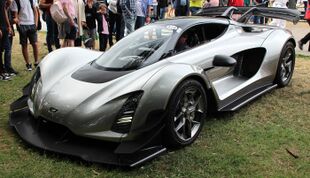Engineering:Czinger 21C
| Czinger 21C | |
|---|---|
 | |
| Overview | |
| Manufacturer | Czinger Vehicles[1] |
| Production | 2021–present |
| Designer | David O’Connell Kevin Czinger Lukas Czinger |
| Body and chassis | |
| Class | Sports car (S) |
| Body style | 2-door coupé |
| Powertrain | |
| Engine | 2.88 L (176 cu in) flat-crank DOHC Twin turbo V8 |
| Electric motor | 3x Electric Motors (1x Advanced axial flux Motor Generator Unit (MGU) + 2x high output electric motors with torque-vectoring function for efficient wheel control) |
| Power output | 750 hp (559 kW; 760 PS) 397 lb⋅ft (538 N⋅m; 55 kg⋅m) of torque 1,250 hp (932 kW; 1,267 PS) at 11,500 rpm (combined) |
| Transmission | 7-speed sequential transaxle with hydraulic actuated multi-plate clutch |
| Hybrid drivetrain | Combination Parallel hybrid and Through the Road (TTR) hybrid |
| Battery | 2 kWh lithium titanate battery |
| Dimensions | |
| Width | 2,050 mm (80.7 in) |
| |uk|Kerb|Curb}} weight | 1,620 kg (3,570 lb) |
| Chronology | |
| Predecessor | Divergent Blade |
The Czinger 21C is a hybrid sports car developed using 3D printing[2] by the American car manufacturer Czinger Vehicles. Manufacturing began in 2021,[3] with a planned production run of 80 units and deliveries starting Q4 2023, most expected to be delivered in 2024 according to founder Kevin Czinger.[4]
Presentation
Designed, developed and built in Los Angeles, California, the Czinger 21C launched the new brand Czinger Vehicles[5] named after its founders Kevin and Lukas Czinger. The car was to be presented at the Geneva Motor Show in March 2020, but the show was canceled due to the COVID-19 pandemic.[6] It was instead presented on March 11, 2020, in London during a special event.[7]
Czinger Vehicles will produce only 80 units in two configurations: a road variant and a track variant called "Lightweight Track".[8]
Technical characteristics
The 21C has a driver's seat in the central position and an in-line, tandem passenger seat behind that of the driver, minimizing the width of the cockpit.[9][10]
The brake calipers and suspension components are combined into a single unit called the BrakeNode.[2]
Powertrain
The 21C has a hybrid gasoline engine consisting of a bespoke twin-turbo V8 of 2.88 liters (176 cu in) capacity, has a bore x stroke of 84 mm × 65 mm (3.31 in × 2.56 in) in the rear central position associated with two electric motors located on the front and powered by a lithium titanate battery. The combination provides 1,250 horsepower (932 kW; 1,267 PS) at 10,500 rpm transmitted to the rear wheels via a seven-speed sequential transaxle with hydraulic actuated multi-plate clutch.[11] A 1,350 horsepower (1,010 kW) option is also available.
Lap records
| Year | Venue/Event | Driver | Time |
|---|---|---|---|
| 2021 | Laguna Seca | Joel Miller | 1:25.44 |
| 2024 | 1:24.75 | ||
| Goodwood Festival of Speed | Chris Ward | 48.82 | |
| Circuit of the Americas | 2:10.70 |
The 21C has set a number of production car lap records. In August 2021 Joel Miller set a time of 1:25.44 minutes around Laguna Seca using road legal Michelin Pilot Sport Cup2R tires and a high downforce track version of the car.[12] This record was reclaimed in August 2024 once again by Joel Miller, setting a time of 1:24.75 minutes. [13] The 21C also set records in 2024 at the Goodwood Festival of Speed Hillclimb and the Circuit of the Americas, with times of 48.82 seconds from Chris Ward,[14] and 2:10.70 minutes respectively.[15]
See also
- List of production cars by power output
Notes and references
- ↑ "Czinger website". https://www.czinger.com.
- ↑ 2.0 2.1 Stevens, Tim (January 2023). "The Real Value of 3D Printing". Road & Track 14: 22.
- ↑ Jean-Etienne Celle (17 February 2020). "Czinger 21C Hybride : une hypercar de 1233 chevaux". https://www.turbo.fr/actualite-automobile/czinger-21c-hybride-une-hypercar-de-1233-chevaux-157597.
- ↑ Pequeño IV, Antonio (2022-06-27). "Czinger Vehicles Establishes Dealer Network" (in en-US). https://labusinessjournal.com/featured/czinger-vehicles-establishes-dealer-network/.
- ↑ claudeenduranceinfocom (17 February 2020). "1250 chevaux pour la Czinger 21C". https://www.endurance-info.com/fr/1250-chevaux-pour-la-czinger-21c/.
- ↑ Virginie Lenk (28 February 2020). "Le Salon de l'automobile de Genève est annulé". https://www.tdg.ch/suisse/conseil-federal-interdit-manifestations-mille-personnes/story/19591038.
- ↑ Pierre Desjardins (12 March 2020). "Czinger 21C : la voiture du futur peut faire encore rêver". https://www.caradisiac.com/czinger-21c-la-voiture-du-futur-peut-faire-encore-rever-181921.htm.
- ↑ Audric Doche (21 February 2020). "Salon de Genève 2020 : la nouvelle marque Czinger avec la supercar 21C". https://www.caradisiac.com/salon-de-geneve-2020-la-nouvelle-marque-czinger-avec-la-supercar-21c-181489.htm.
- ↑ Maxime K (17 February 2020). "Czinger 21C (2020) : 1.250ch pour la supercar imprimée en 3D". https://news.sportauto.fr/news/1546554/Czinger-21C-impression-3D-vid%C3%A9o-salon-Gen%C3%A8ve-2020.
- ↑ Golson, Daniel. "Czinger 21C First Ride Review: 3D-Printed Absurdity" (in en). https://www.cnet.com/roadshow/news/czinger-21c-hypercar-first-ride-review-3d-printed-divergent-manufacturing/.
- ↑ J-C Etter (21 February 2020). "Czinger 21C: les détails". https://www.asphalte.ch/news/2020/02/czinger-21c-les-details/2/.
- ↑ Rowan Horncastle (6 August 2021). "Czinger’s 21C hypercar lapped Laguna Seca two seconds quicker than a McLaren Senna". https://www.topgear.com/car-news/supercars/czingers-21c-hypercar-lapped-laguna-seca-two-seconds-quicker-mclaren-senna.
- ↑ Czinger Vehicles (30 August 2024). "CZINGER VEHICLES SECURES THIRD TRACK RECORD THIS SUMMER, RECLAIMS TITLE OF FASTEST LAP AT LAGUNA SECA". https://www.prnewswire.com/news-releases/czinger-vehicles-secures-third-track-record-this-summer-reclaims-title-of-fastest-lap-at-laguna-seca-302235127.html.
- ↑ Adam Wilkins (27 September 2024). "Video: On-board the Czinger 21C’s record-breaking FOS assault". https://www.goodwood.com/grr/event-coverage/festival-of-speed/video-on-board-the-czinger-21cs-record-breaking-fos-assault/.
- ↑ Shafiq Abidin (16 August 2024). "The Czinger 21C is now the production car record holder at COTA". https://www.topgear.com/car-news/motorsport/czinger-21c-now-production-car-record-holder-cota.
External links
 |
